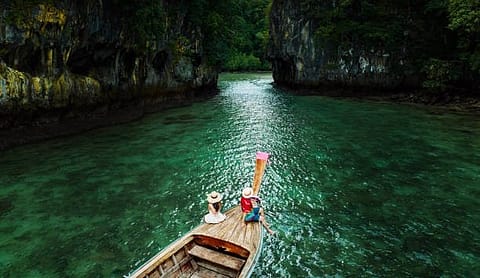India’s LGBTQ+ travel boom: A $552 bn opportunity waiting to be unlocked?
While travel is often associated with freedom and exploration, for gender-diverse individuals, it can be fraught with anxiety.

The global LGBTQIA+ travel market, valued at $331 billion in 2024, is projected to grow to $552 billion by 2031. In India alone, the LGBTQIA+ population is estimated to be around 140 million, presenting a significant and largely untapped market for the travel and hospitality industry.
Despite this immense potential, LGBTQ+ travellers often face discrimination, discomfort, and a lack of inclusivity in travel spaces. “It is the experience of almost all trans and gender-diverse people. We have gone through a lot of pain, which makes us uncomfortable, traumatizes us, and keeps telling us that we’re not welcome in these spaces,” shares Rudrani Chettri, founder of Mitr Trust.
While travel is often associated with freedom and exploration, for gender-diverse individuals, it can be fraught with anxiety. However, as conversations around inclusivity gain traction, the industry is beginning to recognise the importance of welcoming LGBTQ+ travellers—not just as a social responsibility but as a lucrative business opportunity.
With nearly 50% of India’s population comprising millennials and Gen Z—of which up to 25% are queer affirmative—there is a growing demand for inclusive travel experiences. “The LGBTQ+ community in India is in a position to revamp and transform the travel and hospitality industry. With this symposium, we aim to tap into a market that is very much willing and ready to engage,” says LoAnn Halden, Vice President of Communications, IGLTA.
Yet, challenges persist. Discrimination, lack of sensitisation, and the absence of clear policies continue to hinder seamless travel experiences for LGBTQ+ individuals. While major hotel chains are making strides, smaller businesses often lack the training and resources to ensure inclusivity. This is where education and policy implementation play a critical role.
“The people working in these organisations should be trained to interact with us… that’s paramount,” says Aashin Moitra, General Manager, Kitty Su. Simple measures such as training staff on pronouns, ensuring non-discriminatory check-in processes, and creating visible markers of inclusivity can significantly impact travellers’ experiences.
Beyond sensitisation, embedding inclusivity into business models is key. “The pink economy, driven by the purchasing power of the LGBTQ+ community, is emerging as a powerful catalyst globally. Inclusive businesses and policies are unblocking new markets, fostering innovation, and enhancing brand employability,” says Vivek Shukla, CEO of The Lalit Suri Hospitality Group.
Recommended Stories
Shukla identifies five key focus areas for making LGBTQ-friendly travel more widespread in India: policy implementation, sensitisation training, marketing initiatives, community engagement, and safety measures. These efforts not only create welcoming spaces but also build long-term trust with LGBTQ+ travellers.
At its core, LGBTQ+ travellers seek the same experiences as everyone else—natural beauty, urban adventures, and cultural immersion, rather than just queer-specific events. “Mainstream companies often think they have to have queer-specific offerings… but when LGBTQ+ people travel, they’re primarily traveling for the same reasons as everybody else,” says Billy Kolber, co-founder of Hospitable Me.
For businesses, the key lies in striking a balance—being visibly inclusive without resorting to tokenism. “As Indian travel businesses open up to the idea that LGBTQ travel is possible for them, it suddenly looks like a very attractive market… with a little bit of information and training, it opens up an enormous opportunity,” Kolber adds.
Historically, India’s cultural heritage has long recognised diverse identities, predating colonial laws that imposed restrictive norms. Today, the travel and hospitality industry stands at the cusp of rediscovering that legacy—not just as a matter of ethics but as a strategic business move that fosters belonging for all.
(INR CR)